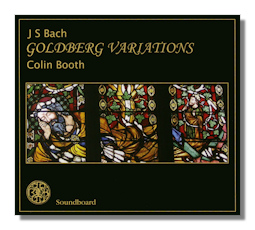
The Internet's Premier Classical Music Source
Related Links
- J.S. Bach Reviews
- Latest Reviews
- More Reviews
-
By Composer
-
Collections
DVD & Blu-ray
Books
Concert Reviews
Articles/Interviews
Software
Audio
Search Amazon
Recommended Links
Site News
 CD Review
CD Review
Colin Booth's Goldberg Variations (BWV 988) makes a useful addition to an already crowded catalog. His playing – on one of Booth's own harpsichords, after a Mietke from about 1710 – is expressive, controlled, sprightly and full of grace… the tempo in Variation 15, the single manual canon at the fifth [tr.16], for example is measured, exposed and transparent. One senses that Booth is not only entirely at home and comfortable with the music, but also fully aware of its great place in the canon. If not quite in awe, full of respect.
Booth's performance is based on a stimulating but persuasive premise. That, for all Bach was a meticulous notator, the full impact of his musical world can only be felt when a performer observes such conventions as obtained at the time; and does so, perhaps, more readily than adhering exclusively only to the notation. For this, Booth claims, is to privilege a literal reading of Bach over an unduly expressive one. He explores this in his book, "Did Bach really mean that?" (ISBN-10: 0954748816; ISBN-13: 978-0954748814), to which reference is made in the informative essay that forms this CD's liner notes. Indeed, this recording is partly intended to illustrate the conclusions which Booth's book reaches.
For example, in preferring to see the Goldbergs as exemplifying the galant style, which was emerging in the later years of Bach's life, rather than the virtuosic, Booth attempts to highlight wit (without ever giving playfulness its head, one feels) over sobriety. As Booth writes, "Most of the variations… are much more lighthearted [than number 25]."
But Booth's account is neither too bubbly nor at all lightweight; still less in any way superficial. Indeed, he is ultra-conscious of how Bach probably saw the import and importance of the work. To reconcile this paradox, we need to see the process of composition and composing from a pre-Enlightenment point of view. At the very least, it should be assumed that the mathematical complexities, understanding of and fluency in ornamentation and ability to follow the interplay of bass line with melody as both contrasting and complementary musical entities were obvious to eighteenth century listeners. They were Bach's starting points, not a summit for modern minds. On the other hand, Booth claims that the modern concert performance with short or no pauses between variations is unlikely to have been how the Goldbergs were known to contemporary audiences; if for no other reason than to offer time for the highly complex counterpoint to become familiar and gain appreciation. Rather than "sink in", Moog fashion, presumably. That you should judge for yourself.
As would be expected, Booth is explicit, clear and precise on the issues of ornamentation. He takes earlier specialists to task. And it has to be said that the result in his playing is not only convincing and effective, but rather lovely. Booth's answer here is to avoid repetitious ornamentation, but to use more single-note additions, especially, than is now common in playing the Goldbergs. If you believe that this is more closely in accord with what Bach intended, and at the same time accept that Bach valued the freedom of musicians to interpret his music as they wished, then this is a convincing approach.
If this is accepted, then each impetus which Booth applies to the work implicitly allows greater latitude than does a more monolithic, perhaps currently more fashionable (because worshipful) account. This is not to find any waywardness in Booth's playing. Listen to that same, 25th, variation (Landowska's "Black Pearl") [tr.26], for instance, for every nuance of profundity and seriousness. But in a pre-Romantic, pre-"heroic" milieu. This resolves the paradox: adherence to perceived practice at the time, which included specific interpretative license; not carte blanche for improvisation's sake.
This is a real achievement on Booth's part; and one to which you will warm on repeated listenings to this CD. So it's far from being yet another Goldberg Variations release. Booth's is a significant contribution to the still vibrant debate on historically-informed performance practice. And one which has the merit of producing a highly satisfying and stimulating listening experience. The recording is relatively closely miked in such a way as to concentrate our listening on the music and, secondarily, the mechanics of the harpsichord (always welcome) in a warm acoustic. Well worth looking out and investigating. Available at www.soundboard-records.co.uk.
Copyright © 2011, Mark Sealey.













